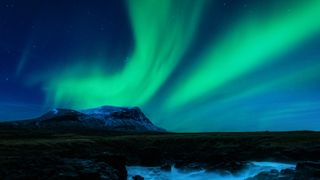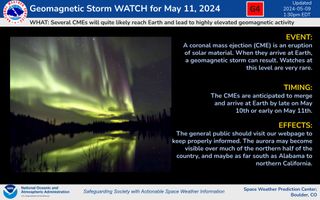
Auroras above Iceland.
(Image credit: Anna Gorin/Getty Images)
The National Oceanic and Atmospheric Administration’s Space Weather Prediction Center (SWPC) has bumped up this weekend’s geomagnetic storm watch to a level G 4, the second highest on the scale. The change comesas solar activity continues at high levels and at least four coronal mass ejections (CMEs) propel toward Earth.
According to the NOAA’s SWPC, to have a watch at this level is rare, but it is indeed issued when there’s a high likelihood that several CME’s will reach Earth and create “highly elevated” geomagnetic activity. As we’ve reported lately, it’s been pretty busy in space within the last week. But most recently, numerous high-level solar flares and their associated CMEs from several sunspot regions have been seen increasing, which has also upped the potential effects of this solar activity. Late Friday into Saturday, these events may not only affect space, but also Earth in terms of our satellite communication systems and, yes, whether auroras will be visible.

Information about May 11th’s geomagnetic storm watch, courtesy of the NOAA. (Image credit: NOAA Space Weather Prediction Center (SWPC))
The NOAA defines CMEs as an “eruption of solar material,” and as they approach our planet, we can experience a geomagnetic storm. With this particular event, the CMEs are expected to merge as they near Earth and could arrive as early as late Friday (May 10). The NOAA Space Weather Scale helps communicate to the public what impacts we could see from space weather conditions both across the planet and when it comes to anything in low earth orbit (LEO).
At the G 4 level, more specifically, there’s a threat for widespread problems with voltage control and impacts to the grid which could affect some protective systems. Satellite and low-frequency radio navigation systems such as GPS could be disrupted and spacecraft operations could also have issues when it comes to surface charging and tracking.
A Triple Play! Back-to-back #solarstorm direct hits chase a third storm to Earth. First impact begins midday May 10. NOAA models show the direct hits should arrive by early May 11. Expect #aurora chances well into mid-latitudes. G2+ conditions possible. Expect #GPS, #HF radio… pic.twitter.com/imJzt3SCfdMay 8, 2024
However, on a positive note for those who have “seeing the Northern Lights” on their bucket lists, there is an increased possibility as well to see the aurora across parts of the U.S. this weekend. The current forecast has the northern half of the U.S. in the view path with the best chances falling in northern Montana, Minnesota, Wisconsin and the majority of North Dakota. This could change as time passes, so keep checking back with the SWPC’s experimental Aurora viewline if you’re interested in catching some lovely auroras. Of course, the visibility for viewing will also depend on local weather conditions and proximity to city lights.
You can get up-to-date information on the event from The SWPC’s forecast discussion.
Breaking space news, the latest updates on rocket launches, skywatching events and more!
Join our Space Forums to keep talking space on the latest missions, night sky and more! And if you have a news tip, correction or comment, let us know at: [email protected].
Meredith is a regional Murrow award-winning Certified Broadcast Meteorologist and science/space correspondent. She most recently was a Freelance Meteorologist for NY 1 in New York City & the 19 First Alert Weather Team in Cleveland. A self-described “Rocket Girl,” Meredith’s personal and professional work has drawn recognition over the last decade, including the inaugural Valparaiso University Alumni Association First Decade Achievement Award, two special reports in News 12’s Climate Special “Saving Our Shores” that won a Regional Edward R. Murrow Award, multiple Fair Media Council Folio & Press Club of Long Island awards for meteorology & reporting, and a Long Island Business News & NYC TV Week “40 Under 40” Award.
>>> Read full article>>>
Copyright for syndicated content belongs to the linked Source : Space.com – https://www.space.com/solar-storm-coronal-mass-ejections-mothers-day-weekend-storm-watch










